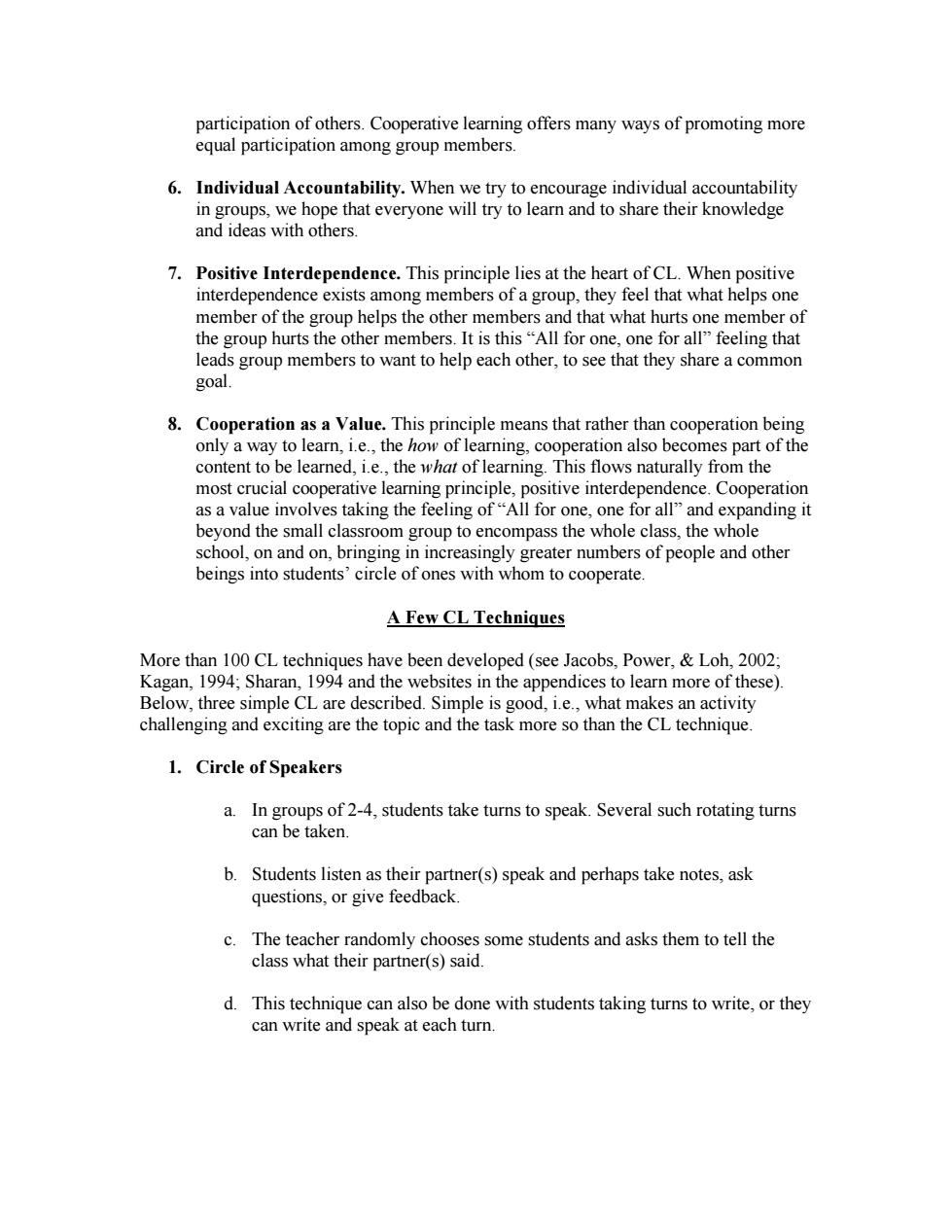正在加载图片...

participation of others.Cooperative learning offers many ways of promoting more equal participation among group members. 6.Individual Accountability.When we try to encourage individual accountability in groups,we hope that everyone will try to learn and to share their knowledge and ideas with others. 7.Positive Interdependence.This principle lies at the heart ofCL.When positive interd pe xists among s of a group,they feel that what helps one m ber of th mem nd tha what hurts nber group hurts It is this for one one or al feeling th group members to want to help each other,to see tha at they share a commo goal 8.Cooperation asa Value.This principle means that rather than cooperation being only a way to leamn,i.e.,the how of learning,cooperation also becomes part of the content to be learned,i.e.,the what of learning.This flows naturally from the most crucial cooperative learning principle,positive interdependence.Cooperation as a value involves taking the feeling of"All for one,one for all"and expanding it beyond the small classroom group to encompass the whole class,the whole school,on and on,bringing in increasingly greater numbers of people and other beings into students'circle of ones with whom to cooperate. A Few CL Techniques More than 100 cL techniques have been develoned (see Jacobs power&loh 2002 Kagan.1994:Sharan.1994 and the websites in the a ap endices to learn more of these). Below.three sim i.ie..what makes an activity more so than the Cl techr 1.Circle of Speakers a In group s of 2-4,students take turns to speak.Several such rotating turns can be taken b.Students listen as their partner(s)speak and perhaps take notes,ask questions.or give feedback c.The teacher randomly chooses some students and asks them to tell the class what their partner(s)said. d.This technique can also be done with students taking turns to write,or they can write and speak at each turn.participation of others. Cooperative learning offers many ways of promoting more equal participation among group members. 6. Individual Accountability. When we try to encourage individual accountability in groups, we hope that everyone will try to learn and to share their knowledge and ideas with others. 7. Positive Interdependence. This principle lies at the heart of CL. When positive interdependence exists among members of a group, they feel that what helps one member of the group helps the other members and that what hurts one member of the group hurts the other members. It is this “All for one, one for all” feeling that leads group members to want to help each other, to see that they share a common goal. 8. Cooperation as a Value. This principle means that rather than cooperation being only a way to learn, i.e., the how of learning, cooperation also becomes part of the content to be learned, i.e., the what of learning. This flows naturally from the most crucial cooperative learning principle, positive interdependence. Cooperation as a value involves taking the feeling of “All for one, one for all” and expanding it beyond the small classroom group to encompass the whole class, the whole school, on and on, bringing in increasingly greater numbers of people and other beings into students’ circle of ones with whom to cooperate. A Few CL Techniques More than 100 CL techniques have been developed (see Jacobs, Power, & Loh, 2002; Kagan, 1994; Sharan, 1994 and the websites in the appendices to learn more of these). Below, three simple CL are described. Simple is good, i.e., what makes an activity challenging and exciting are the topic and the task more so than the CL technique. 1. Circle of Speakers a. In groups of 2-4, students take turns to speak. Several such rotating turns can be taken. b. Students listen as their partner(s) speak and perhaps take notes, ask questions, or give feedback. c. The teacher randomly chooses some students and asks them to tell the class what their partner(s) said. d. This technique can also be done with students taking turns to write, or they can write and speak at each turn